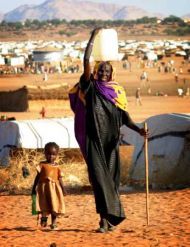Darfuris still flooding refugee camp-aid workers
By Nima Elbagir
KALMA, Sudan, Feb 17 (Reuters) – Hundreds of refugees are still flooding into the sprawling, overcrowded Kalma camp in Sudan’s Darfur region as they flee attacks by soldiers and militias, aid workers said on Thursday.
 “Last week we received 600,” said one humanitarian aid worker, who declined to be named.
“Last week we received 600,” said one humanitarian aid worker, who declined to be named.
“In November, December and January, there was a flood of people coming into the camps from a combination of attacks by military and militias,” said Philippe Schneider, an aid worker with a U.N. agency.
The camp, built for 60,000 people, is now home to more than 150,000.
Many of the newer arrivals are sleeping at the edge of the camp, sheltering in lean-to’s made of dried straw, branches, and hessian sacks.
Hundreds of children in tattered clothing and covered in dust wander through the camp, which has become so big it has developed its own micro-economy, with a busy market at the centre where people sell anything from vegetables to clothes.
Men sit around under trees, afraid to leave the camp. Women nervously cover their faces to avoid being photographed, afraid of the retribution that recognition might bring.
At least 70,000 people have died since March and 2 million have fled their homes because of the conflict in Darfur, described by U.N. Secretary-General Kofi Annan this week as “little short of hell on earth”.
Representatives from Darfur’s two main rebels groups met government officials in Chad’s capital N’Djamena on Thursday to revive stalled peace talks and reinforce a shaky ceasefire.
After years of tribal conflict over scarce resources, Darfur’s rebels took up arms in February 2003, accusing Khartoum of neglect and giving preferential treatment to Arab tribes.
They say the government mobilised Arab militias, known as Janjaweed, to loot and burn non-Arab villages. The government says it recruited militias to fight the rebellion but not the Janjaweed, whom it has called outlaws.
“The people have no trust … The police are sometimes unwilling to protect them, sometimes unable (to protect them) and sometimes are themselves the perpetrators,” said the aid worker who did not want to be named.
The government says the situation in the area is improving.
“Security is good … People are obsessed because of what happened in the past but things are better now,” said South Darfur state’s governor, Alhaj Atta Almannan.
The residents of Kalma Camp are not convinced.
“The only way I would go home is if Kofi Annan is driving me there,” said one man who fled his home three months ago.
